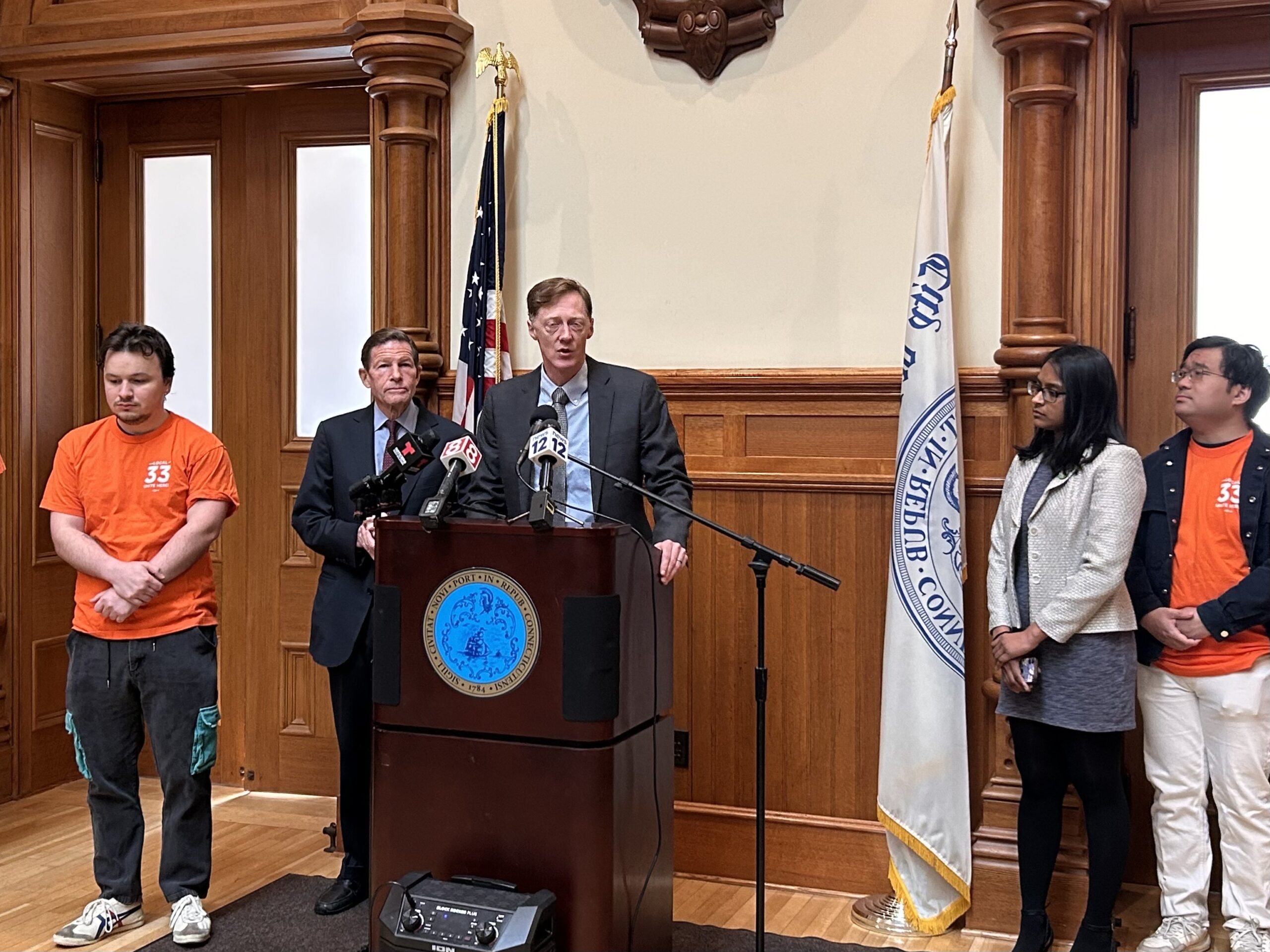Blumenthal, New Haven demand answers for revoked student visas
On Thursday, Senator Richard Blumenthal announced he has written to federal officials demanding transparency and an end to the revocation of student visas.

Tina Li, Contributing Photographer
Senator Richard Blumenthal and Mayor Justin Elicker condemned the federal government’s revocation of international student visas in an impassioned press conference at City Hall on Thursday morning, calling for answers and an immediate halt to what they described as a chilling attack on academic freedom and institutional values.
At least 50 international students studying at Connecticut universities have lost their visas and legal status in the country, according to the CT Mirror. That number includes four visa revocations at Yale and 13 at the University of Connecticut. And the count may rise as the Department of Homeland Security begins to screen international students’ social media accounts for “links to antisemitic activity,” per a new policy announced last week.
Blumenthal, flanked by Elicker and members of the Yale graduate student union UNITE HERE Local 33, announced that he had sent a letter to key federal officials — including Secretary of State Marco Rubio, Secretary of Homeland Security Kristi Noem and Acting ICE Director Todd Lyman — demanding transparency on the visa cancellations and calling for an end to the revocations.
In the letter, Blumenthal requested details on how many visas have been revoked, which types and under what justification. He set an April 25 deadline for a response.
“We’ve watched in horror over these last weeks as international students with valid visas have seen those visas revoked,” Blumenthal said. “We’ve watched the revocation of those student visas arbitrarily, capriciously, without any apparent due process or rhyme or reason.”
So far, schools are only finding out about students being affected through the Student and Exchange Visitor Information System, a database that monitors international students’ immigration statuses. Yale’s Office of International Students and Scholars currently checks the database hourly, OISS Director Ozan Say previously told the News.
Blumenthal emphasized the visa revocations’ broader implications for Connecticut’s academic and economic ecosystem, as Yale hosts over 2,800 international students and the University of Connecticut more than 3,400. He pointed out that international students contributed about $770 million to the Connecticut economy in a year, referring to a study by the National Association of Foreign Student Advisers.
Elicker was more blunt in his remarks, lambasting the Trump administration’s immigration and economic policies as contributing to “America’s great decline.”
Due to recent National Institutes of Health funding cuts, Yale-supported development projects in New Haven have already been stalled, causing the city to potentially lose out on millions of dollars of tax revenue, according to Elicker.
“Revoking student visas is designed to intimidate and silence,” Elicker said. “The ‘Make America Great’ lipstick is quickly being washed away to show the pig underneath. What America is doing right now, what Trump is doing is making America weak.”
Elicker looked nostalgically at how, in the past, America had proudly embraced being a “melting pot.” The current federal administration is adopting authoritarian tactics, he said; it is no longer safe to express your political views, and Trump is seeking to target immigrants as his “boogeyman.”
“Now is the time to put our foot on the gas of resistance, and in New Haven, we will continue to stand up for what is right and push back to protect our most vulnerable residents,” Elicker said.
Arita Acharya, secretary-treasurer of UNITE HERE Local 33, spoke on behalf of graduate student workers. The daughter of immigrants who came to the U.S. to study and conduct research, Acharya warned that targeting international students would be disastrous for the country’s standing as a “global powerhouse for scientific discovery.”
“These are real people, our neighbors and our colleagues, who are living with the fear of being uprooted from their lives here for opaque reasons and with little recourse,” Acharya said.
Both Blumenthal and Elicker also underscored the vital role international students play in New Haven and Connecticut — renting homes, teaching and often staying to become leaders and innovators.
Blumenthal praised Harvard, where he went to college, for standing up to Trump’s “dictatorial and tyrannical” demands. He has already spoken with several university presidents about research funding cuts and student visa revocations, he said, and he urged institutions to defend their values and principles of academic freedom.
Blumenthal graduated from Harvard College in 1967.
Interested in getting more news about New Haven? Join our newsletter!







